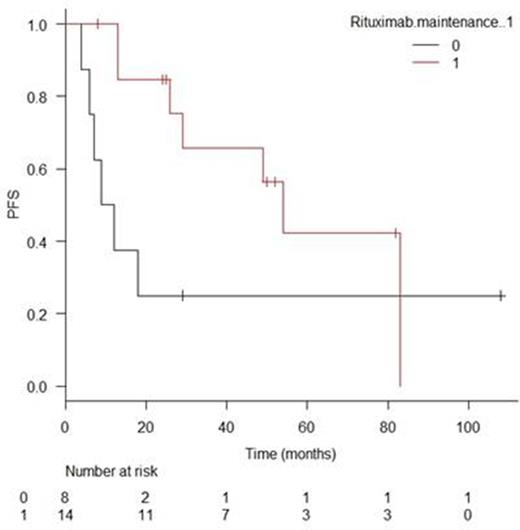Abstract
Introduction
Mantle cell lymphoma (MCL) is a rare B-cell non-Hodgkin lymphoma (NHL) accounting for 5 percent of NHLs. Most patients with MCL are 60 years of age and older. The prognosis of patients with MCL is moderately aggressive and variable; the median overall survival is 3-5years. MCL international prognostic index(MIPI)is related to prognosis of the patients with MCL, however, it is unclear whether MIPI predicts outcomes of MCL over sixties. Out therapeutic strategy in elderly patients with newly diagnostic MCL is not high-dose chemotherapy with autologous stem cell transplantation. Instead of aggressive chemotherapy, Rituximab maintenance is considered as an effective and feasible option.
Thus, we investigated whether MCL international prognostic index (MIPI) relates overall survival (OS) or progression free survival (PFS), and whether maintenance therapy with Rituximab improved OS or PFS in patients with newly diagnosed MCL patients 60 and older.
Methods
We analyzed retrospectively 60 years of age and older patients with MCL who have achieved complete response (CR) or partial response (PR) after induction chemotherapy with rituximab at our hospital from December 2005 to February 2015. Two of primary refractory patients were excluded because analysis is for patients who are eligible for rituximab maintenance therapy. The patients were diagnosed by hematopathologist in our hospital. According to the MIPI, patients were stratified into low risk (0 patients, 0%), intermediate risk (9 patients, 41%), and high risk (13 patients, 59 %). Induction chemotherapy regimens were six cycles of R-CHOP (rituximab-cyclophosphamide-doxorubicin-vincristine-prednisone), four cycle of R-hyper CVAD/MA (rituximab-cyclophosphamide-vincristine-doxorubicin-dexamethasone alternating with rituximab-methotrexate-cytarabine), six cycles of R-CVP (rituximab- cyclophosphamide-vincristine-predonisone), R-VP16 (rituximab-etoposide), or six cycles of VR-CAP (bortezomib-rituximab-cyclophosphamide-doxorubicin- predonisone). Rituximab maintenance therapy started 6 months after the last induction chemotherapy and underwent four weekly infusion every 6 months for 2 years.
Results
A total of 22 MCL patients were analyzed. The number of patients who had achieved CR was 14 and PR was 8. 14 of 22 patients were treated rituximab maintenance. Median age was 73 years old. MIPI could predict OS of MCL. 3-year-OS was significantly superior intermediate risk to MIPI high risk (3-years-OS: 87.5 %vs.51.9 %,p=0.0232), whereas PFS didn't have correlation with MIPI(3-years PFS70.0 %vs.38.5 %,p=0.136). 3-years OS was significantly superior maintenance group to no maintenance group (3-years survival rate 91.7 % vs. 25.0 %, p=0.00188, figure 1), and 3-years PFS tend to improve in the maintenance group (3-years PFS, 65.8 % vs.25.0 %, p=0.0773, figure 2).
Conclusion:
In this study, MIPI correlates with OS, however doesn't show with PFS. Rituximab maintenance therapy is effective, and prolongs OS for 60 years of age and older patients with MCL.
Nishimura:Chugai Pharmaceutical CO., LTD.: Consultancy. Mishima:Chugai Pharmaceutical CO., LTD.: Consultancy. Yokoyama:Chugai Pharmaceutical CO., LTD.: Consultancy. Hatake:Chugai Pharmaceutical CO., LTD.: Other: lecture speaking.
Author notes
Asterisk with author names denotes non-ASH members.



This feature is available to Subscribers Only
Sign In or Create an Account Close Modal